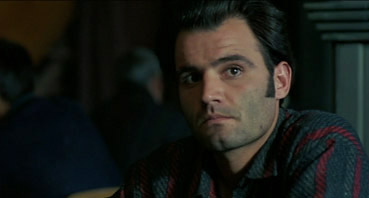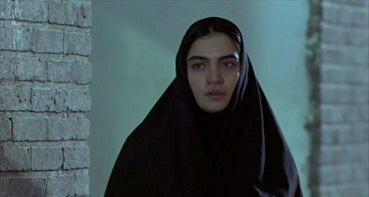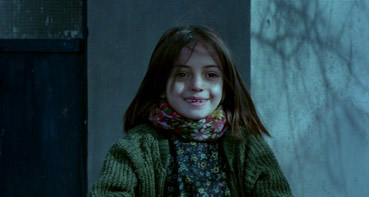|
Possibly
the most striking and unexpected image in Nuru Bilge Ceylan's
quietly mesmerising 2002 film Uzak was the
sight of Istanbul buried under a carpet of snow. It's not
that it never snows in Istanbul, but that we so rarely see it
shown that way on film. Istanbul is almost always portayed as a scorching hot location, and to see if covered in the
white stuff was, for me at least, an eye-bulging moment.
With It's Winter [Zemestan],
Iranian director Raffi Pitts provides us with a similarly
wintry view of Tehran, another city that has largely escaped
such cinematic presentation in the past. At least
you're a little more prepared here by the title and the
poster, which features a heavily coated figure running through a bright white and only sparesely featured snowscape.
There
are those who go into depression during the winter
months, who whither when deprived of the summer sunshine
and heat. I am not one of them. Quite the opposite. For
me, summer is too bright and too damned hot.* I like the
winter, but snow is something I now see on TV or in
films or read about rather than experience. I miss it. But I appreciate
the potential of bleak, snowy winters as a metaphor
for isolation and unhappiness (memorably realised in Dagur
Kári's 2003 Nói albinoi),
the landscape reduced to a single colour, its inhabitants
cocooned against the cold in heavy clothing that strips
them of their individuality. Insufferably upbeat Christmas
stories aside, snow is rarely one of cinema's good omens.

This
is certainly the case in the evocative opening scene of
It's Winter, where a man's dejected face
and posture, the closing of a workshop, a close-up of a
padlock being secured and a slow, unhappy walk through a
snowstorm are all that is needed to tell us that the character
we are following, the unfortunate Mokhtar, has lost his
job and has little prospect of finding another. By the time he reaches
his isolated house he has come to a decision, to leave his
young daughter, his mother and his wife Khatoun, and go of in search
of work abroad, promising to return with money as soon
as he can.
As
Mohktar leaves the district, enigmatic drifter Marhab arrives, landing at the local hostel too late for a meal but
still with enough energy to ingratiate himself with fellow
occupant Ali Reza, whom he persistently pesters into friendship.
Marhab is also looking for work and is initially undeterred
by the lack of opportunities here, harassing potential employers
like an Iranian Yosser Hughes and eventually landing engineering
work alongside his new friend. But the boss doesn't seem
to like him, his pay is not forthcoming, and Marhab would frankly
rather be off having fun. By this point he's caught sight
of Khatoun going about her daily business and has become
entranced by her, to the point where he will sit across the
railway tracks from her house just to watch where she lives.
When she is unable to afford a red sweater for her daughter
at a market, Marhab buys it and delivers it to her house,
offering it to the daughter but chased away by Khatoun's
morally protective mother. One day, with nothing heard from
Mohktar since his departure, the police arrive at Khatoun's
door with bad news, which Marhab observes from his watching
place across the tracks. Is now the time to approach Khatoun
and declare his interest?
But
what exactly is his interest in her? If the above gift-giving makes Marhab
sound like a sensitive gentleman, then I've perhaps been
sugar coating him just a little. He's interesting, sure,
but not instantly likeable, coming across as pushy, boastful
and a little shifty, and for a while it's uncertain
that his intentions towards Khatoun are in any way honourable.
But increasingly, there's the sense that the man really is
captivated by this woman's quiet elegance and beauty (and
as played by one of Iran's top female stars Mitra Hajjar,
she certainly displays both), and that there is more than
just lust involved here. This is heightened in their first
awkward meeting, when Khatoun confronts Marhab and demands
to know why he has been following her, prompting the sort
of fumbled, embarrassed response you'd expect more from a shy
teenager than a seemingly self-assured man in his thirties.

Marhab's
subsequent increase in confidence and more determined pursuit
of Khatoun's attention could probably have filled half-an-hour
of screen time, but is dealt with here in less than a minute's worth of
carefully chosen shots. This stylistic
economy allows Pitts to develop the story briskly without
ever hurrying the pace, his focus on character balanced
by a critical view of the employment prospects and financial
hardships in this particular quarter of Iranian society.
There's a captivating sequence towards the film's end when
Marhab bemoans his situation to the proprietor of a bar
in which he is resting, but the camera is angled in such
a way that he appears almost to be directly addressing the
audience. "What's the point?" he asks us, "To
know a trade and be unemployed. What's the point?"
It's a pertinent question and one that transcends national
boundaries – at this moment he could be sitting in the
run-down industrial quarter of just about any number of
cities.
For
both Mokhtar and Marhab, an inability to find work acts
as a form of emasculation, excluding them from one of the
very things that defines their role in both society and
their own family (that Khatoun remains in work throughout
the story no doubt adds to their feelings of dejection).
Marhab may prefer to have a good time rather than work,
but this is hardly the point – he wants to be in a position
to choose, not to have it forced on him by circumstance.
It's an issue whose cinematic lineage goes back to depression-era
America and even silent cinema, and was memorably captured
on British TV in 1982 by Alan Bleasdale's Boys From
the Blackstuff. The unchanging nature of the problem
is underlined here by the sense that history seems destined
to repeat itself, though is also reflective of the cyclic
nature of much of Iranian cinematic storytelling. But Pitts
is wise to this sense of the inevitable, and nicely upsets
expectations with a particularly poignant late-story sting.
It's Winter
has been repeatedly described as bleak, but this fails to
acknowledge its visual poetry (Mohammad Davudi's cinematography
is consistently excellent), its arresting location work
and sense of place, its dramatic and thematic depth, its
brief but memorable upbeat moments, and the hold it can exert
over the willing viewer. There's an honesty to both the
drama and the social commentary that springs in no small
part from the naturalistic performances from a primarily
non-professional cast – Marhab's speech about his poor employment
prospects doubtless comes from the heart, given that the
man who plays him, Ali Nicksaulat, is not an actor by trade
but an engineer who works in the very district in which
the film is set. It's an absorbing and haunting film that
cares about its characters and their fate, and while
specifically Iranian in identity, speaks clearly to a far
wider audience.
An
excellent 1.85:1 anamorphic transfer really does justice
to Davudi's cinematography, with contrast and detail both
of a very high order, perfect black levels but good shadow
detail and naturalistic colours – when they need to be brighter,
as in the factory that Marhab invades in search of work,
they shine.

The
soundtrack is Dolby 2.0 stereo only, but the clarity and
separation are both first rate and add to the film's strong
sense of place, particularly in the exterior locations –
you can even hear the snow as it lands. A really good job
all round.
Interview
with Director Rafi Pitts (40:19)
Even if you've done your research and know that Rafi Pitts
was born in Tehran but fled during the Iran-Iraq war and
studied film at the Polytechnic of Central London, you're
still likely to be surprised at just how English his accent
is. Right from the start, this is enthralling and informative
stuff, as Pitts discusses neo-realism, poetry, the preparations
for the film, the intention to make a work that the community
in which it is set would go to see, and a whole lot more.
The story of how he got non-actor Ali Nicksaulat to look
so embarrassed when confronted by Khatoun is particularly
enjoyable. In
the absence of a commentary, this will do very nicely.
There's
also a brief Biography of Rafi
Pitts.
A engrossing blend of personal drama and social commentary
whose downbeat tone feels appropriate for its setting and
story, and it's so well handled that although a sobering experience,
it's not a depressing one. It's well presented on Artificial
Eye's DVD, with a first class transfer and an enthralling
interview with its director. Recommended, unless your viewing
consists solely of upbeat Hollywood actioners, and then
the chance is you didn't make it to this part of the review
anyway.
|